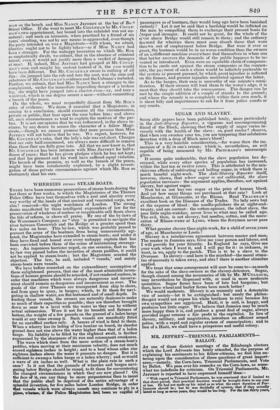WHERRIES versus STEAM-BOATS.
THERE have been numerous prosecutionsof steam-boats during the last three or four weeks, to which the Magistrates of the Thames Police Office have lent themselves with a zeal and alacrity every way worthy of the heads of that ancient and venerated corps, now, alas removed—the night watchmen of London. The strong desire manifested by these intelligent expounders of law for the preservation of whatever of useless or inapplicable still floats above the tide of reform, is above all praise. By one of the by-laws of the Watermeri's Company, no " ship " is permitted to navigate the river between Greenwich and the Bridge at a greater speed than five miles an hour. This by-law, which was probably passed to prevent the arms of the boatmen from being unnecessarily agitated, the Magistrates have extended to steam-boats; and under it they have fined and bound over every unhappy captain that has been convicted before them of the crime of maintaining steerageway. An ingenious barrister urged, on one occasion, that as the by-law was passed before the invention of steam paddles, it could not be applied to steam-boats ; but the Magistrate scouted the objection. The law, he said, included "vessels," and surely steam-boats were vessels.
We have before remarked on the extraordinary assumption of these enlightened persons, that one of the most admirable inventions of human genius should be retarded, if not rendered useless, in order that machines which were always dangerous and inconvenient should remain as dangerous and inconvenient as ever. The goods of the river Thames are transported from ship to shore, and from quay to quay, in barges; which, to fit them for navigating in shallow water, are flat-bottomed and of small depth. In loading these vessels, the owners are naturally desirous to make as much of their capacities as possible; they are therefore brought down as near to a level with the water as they can be without actual submersion. Were it not for its breadth and flatness of bottom, the weight of a few pounds on the gunnel of a laden barge would at any time swamp it. Such vessels are manifestly fitted for an unruffled surface only. A breeze of wind is fatal to them. When a wherry has its lading of live lumber on board, its slender gunnel does not rise above the water higher than that of a laden barge. Its liability to be filled by the slightest swell, is further augmented by the sharpness of its run and consequent crankness. The wave which rises from the mere action of a steam-boat's paddles, when moving at their maximum velocity, does not much exceed eighteen inches in height; and to a boat whose sides rise eighteen inches above the water it presents no danger. But it is sufficient to swamp a laden barge or a laden wherry; and so would a wave of six inches as well. What is the plain rule in such a case? Is it not that the gunnels of wherries and barges navigating below Bridge should be raised, to fit them for encountering the changed circumstances in which they are now placed? On the face of it, can any thing be more preposten5us"than to insist that the .public shall be deprived of the entire advantage of a splendid invention, for five miles below London Bridge, in order vessels which were always unsafe may continue to ply. in a place, whesoe, if the Police Magistrate's had been 'as careful -of I passengers as of boatmen, they would long ago have been banished I entirely? Let it not be said that a hardship would be inflicted on the men by compelling them to exchange their present boats for :urger and stronger. It could not be great, for the whole of the river above Bridge would still remain to them; and the ordinary deinand for wherries there must soon absorb those that were thrown out of employment below Bridge. But were it ever so great, the boatmen would be in no worse condition than the owners of an ifidifferent machine everywhere find themselves in when one that better answers the demands of the public happens to be invented or introduced. Even were an equitable claim of compensation to be made out against the steam companies or the community, the payment of such a claim would be infinitely preferable to the system at present pursued, by which great injustice is .inflicted on the former, and greater injustice meditated against the latter. As to the barges, their case is unworthy of one minute's consideration. If their owners will load them to the water's edge, it is meet that they should take the consequence. The danger can be met by the simple addition of a couple of streaks to the gunnel; and where the remedy is so completely within their own reach, it is sheer folly and impertinence to ask for it from police courts or any courts.


























 Previous page
Previous page